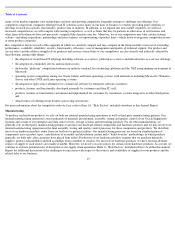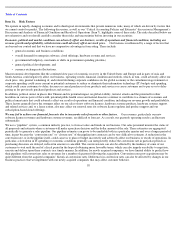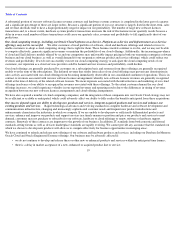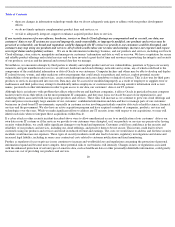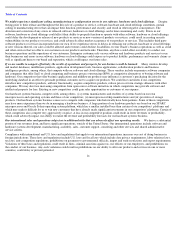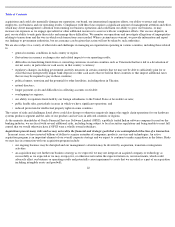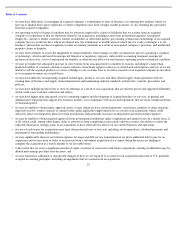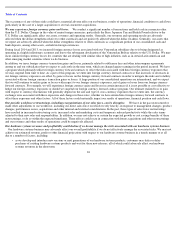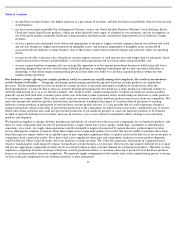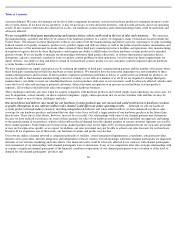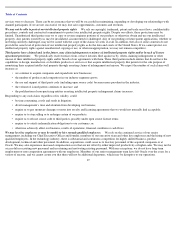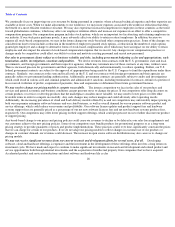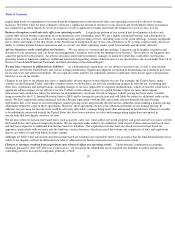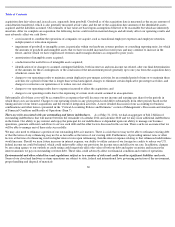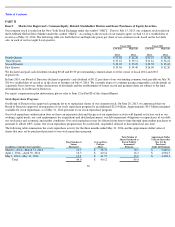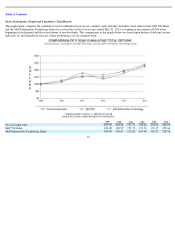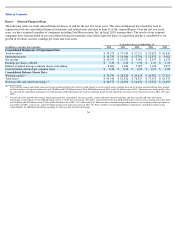Oracle 2013 Annual Report Download - page 28
Download and view the complete annual report
Please find page 28 of the 2013 Oracle annual report below. You can navigate through the pages in the report by either clicking on the pages listed below, or by using the keyword search tool below to find specific information within the annual report.
Table of Contents
The occurrence of any of these risks could have a material adverse effect on our business, results of operations, financial condition or cash flows,
particularly in the case of a larger acquisition or several concurrent acquisitions.
We may experience foreign currency gains and losses. We conduct a significant number of transactions and hold cash in currencies other
than the U.S. Dollar. Changes in the value of major foreign currencies, particularly the Euro, Japanese Yen and British Pound relative to the
U.S. Dollar can significantly affect our assets, revenues and operating results. Generally, our revenues and operating results are adversely
affected when the dollar strengthens relative to other currencies and are positively affected when the dollar weakens. Generally, our assets that
we report are adversely affected when the dollar strengthens relative to other currencies as a significant portion of our consolidated cash and
bank deposits, among other assets, are held in foreign currencies.
During fiscal 2014 and 2013, we incurred foreign currency losses associated with our Venezuelan subsidiary due to it being designated as
operating in a highly inflationary economy and due to the subsequent devaluation of the Venezuelan Bolivar relative to the U.S. Dollar. We may
incur similar foreign currency losses for countries that are dealing with similar risks of high inflation, such as in certain Latin American and
other emerging market countries where we do business.
In addition, we incur foreign currency transaction gains and losses, primarily related to sublicense fees and other intercompany agreements
among us and our subsidiaries that we expect to cash settle in the near term, which are charged against earnings in the period incurred. We have
a program which primarily utilizes foreign currency forward contracts to offset the risks associated with these foreign currency exposures that
we may suspend from time to time. As a part of this program, we enter into foreign currency forward contracts so that increases or decreases in
our foreign currency exposures are offset by gains or losses on the foreign currency forward contracts in order to mitigate the risks and volatility
associated with our foreign currency transaction gains or losses. A large portion of our consolidated operations are international, and we expect
that we will continue to realize gains or losses with respect to our foreign currency exposures, net of gains or losses from our foreign currency
forward contracts. For example, we will experience foreign currency gains and losses in certain instances if it is not possible or cost effective to
hedge our foreign currency exposures or should we suspend our foreign currency forward contract program. Our ultimate realized loss or gain
with respect to currency fluctuations will generally depend on the size and type of cross-currency exposures that we enter into, the currency
exchange rates associated with these exposures and changes in those rates, whether we have entered into foreign currency forward contracts to
offset these exposures and other factors. All of these factors could materially impact our results of operations, financial position and cash flows.
Our periodic workforce restructurings, including reorganizations of our sales force, can be disruptive. We have in the past restructured or
made other adjustments to our workforce, including our direct sales force on which we rely heavily, in response to management changes, product
changes, performance issues, acquisitions and other internal and external considerations. In the past, these types of sales force restructurings
have resulted in increased restructuring costs, increased sales and marketing costs and temporary reduced productivity while the sales teams
adjusted to their new roles and responsibilities. In addition, we may not achieve or sustain the expected growth or cost savings benefits of these
restructurings, or do so within the expected timeframe. These effects could recur in connection with future acquisitions and other restructurings
and our revenues and other results of operations could be negatively affected.
Our hardware systems revenues and profitability could decline if we do not manage the risks associated with our hardware systems business.
Our hardware systems business may adversely affect our overall profitability if we do not effectively manage the associated risks. We may not
achieve our estimated revenue, profit or other financial projections with respect to our hardware systems business in a timely manner or at all
due to a number of factors, including:
24
•
as we develop and introduce new versions or next generations of our hardware systems products, customers may defer or delay
purchases of existing hardware systems products and wait for these new releases, all of which could adversely affect our hardware
systems revenues in the short term;



